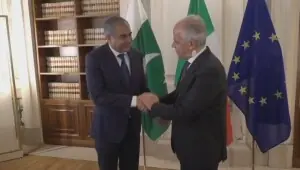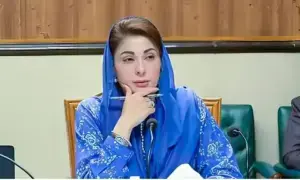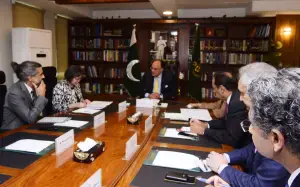PTI asks IMF to audit 30% seats from general election
7 min readThe Pakistan Tehreek-e-Insaf (PTI) has asked the International Monetary Fund (IMF) to audit thirty percent of the country’s seats in the general elections and to factor in the country’s political stability in any further bailout talks, the party said on Wednesday.
Former prime minister Imran Khan’s PTI has sent a letter to the IMF detailing its position, the contents of which the party has now revealed to the media.
The party has told the Fund that it does not wish to ‘stand in the way’ of a any funds being extended to Pakistan. However, it has added that only a popular government can implement reforms, especially related to taxation.
The party has also clarified that it does not wish for the IMF to adopt a ‘investigative’ role as many organisations including FAFEN have proposed methodologies to audit the election.
“Such a role by the IMF would be a great service to Pakistan and its people, and could become the harbinger of enduring prosperity, growth, and macroeconomic stability in the country,” the letter said.
The IMF has yet to receive the letter, the lender said in an email to Reuters.
Uncertainty around elections
A day earlier, Moody’s Investors Service said that there was high uncertainty around the newly elected government’s willingness and ability to quickly negotiate a new IMF programme soon after the current one expires in April.
“Political risks are high, following a highly controversial general elections held on Feb 8, 2024,” it added.
Read: PTI to write letter to IMF today, says Gohar Khan
Last week, the IMF declined to comment on the country’s political situation after Khan’s aides said they would urge the lender to call for an independent audit of Pakistan’s disputed Feb. 8 elections before engaging in further talks with Islamabad.
Sohail Ahmed of Karachi-based Topline Securities said the letter was unlikely to have a major market impact.
“The IMF will do its own due diligence,” he said.
Pakistan’s cash-strapped economy is struggling to stabilise after securing a $3 billion standby arrangement from the IMF last summer, with record inflation, rupee devaluation and shrinking foreign reserves.
Meanwhile, China has rolled over a $2 billion loan to Pakistan, according to unnamed sources in the finance ministry.
The $2 billion loan was due in March and has been extended for one year, it said.
Analysts say a new government - which Khan’s opponents are expected to form - is likely to need more funds from the global lender after the standby arrangement expires in April.
Khan, ousted in April 2022 in a parliament vote of confidence, was accused by opposition parties of scuttling an IMF deal under a $6 billion Extended Fund Facility days before leaving his office, a charge he denies.
An IMF spokesperson said last week that it was focused on the completion of the standby programme but was available to support the post-election government through a new arrangement to address Pakistan’s ongoing challenges if requested.
Full text of PTI letter to IMF
Dear Ms. Georgieva:
This letter is being sent to the International Monetary Fund (IMF) under the instructions and on behalf of Mr. Imran Khan, the founding Chairman of Pakistan’s largest and most popular political party, Pakistan Tehreek-e-Insaf (PTI).
It must be clarified at the very outset that the PTI does not wish to stand in the way of any IMF facility to the state of Pakistan that promotes the immediate as well as the long-term economic well-being of the country. It is clear that such facility, along with the national commitment to bring about necessary reforms that facilitate repayment and enable the country to stand on its own feet, can only be negotiated in the best interests of the people of Pakistan by a duly elected government that has the trust of the people of Pakistan.
Here at PTI, we are well aware of the importance the IMF attaches to good governance, transparency, upholding the rule of law, and curbing corrupt practices while entering into financing arrangements with member countries. Specifically relevant in this regard is the policy that IMF adopted in 1997 by way of the Guidance Note “The Role of the IMF in Governance Issues” which has undergone reviews and enhancements in 2018 and 2023. The following excerpts from the aforesaid Guidance Note are relevant:
“… the IMF needs to take a view on whether the member is able to formulate and implement appropriate policies, this is especially clear in the case of countries implementing economic programs supported by the IMF from the guidelines on conditionality that call on IMF management to judge that ‘the program is consistent with the IMF’s provisions and policies and that it will be carried out.’ As such, it is legitimate for management to seek information about the political situation in member countries as an essential element in judging the prospects for policy implementation”. (paragraph 7) “The staff may also point out that, in an atmosphere of widespread rumors of corrupt practices, and where the rumors have some genuine credence, an independent audit may be desirable to address such concerns”. (paragraph 19)
It is a well-established reality that a government without legitimate representation, when imposed upon a country, carries no moral authority to govern, and, in particular, to carry out taxation measures. In the last interaction held between Mr. Imran Khan and IMF representatives in 2023, PTI had agreed to support IMF’s financing facility involving Pakistan on the condition and reassurance of a free and fair election in the country.
In the foregoing backdrop, it is noteworthy that the general elections conducted in Pakistan on February 8, 2024, on which public expenditure of about PKR 50 billion (or US$ 180 million) was incurred, were subjected to widespread intervention and fraud in the counting of votes and compilation of results. This intervention and fraud have been so brazen that the IMF’s most important member countries including the U.S., Great Britain, and countries forming part of the European Union have called for a full and transparent investigation into the matter. A mission of the European Union has carried out an examination of the general elections of February 8, 2024. The report of the said mission must be examined by the IMF and made available to the people of Pakistan.
In view of the policies and principles the IMF stands for, there should be no doubt that the abuse of power by a small number of holders of public office to impose their likes and dislikes on Pakistan’s populace as aforesaid, and thus to ensure their continuing personal gain, would not be promoted or upheld by the IMF It is not just the PTI, but several other political parties in Pakistan, along with a number of western governments, Commonwealth observers, local civil society organizations, and international print and electronic media, have called for an independent probe into claims of intervention and electoral fraud in the country on and after February 8, 2024.
These calls have, however, gone unheeded for more than two weeks now suggesting that there is no fear of accountability or rule of law with respect to the subversion of the exercise by the people of Pakistan of their right to elect a government. We, therefore, call upon the IMF to give effect to the guidelines adopted by it with respect to good governance as well as conditionalities that must be satisfied prior to the grant of a finance facility that is to burden the people of Pakistan with further debt. An audit of at least thirty percent of the national and provincial assemblies’ seats should be ensured, which can be accomplished in merely two weeks.
We do not call for the IMF to adopt the role of an investigative agency. There are at least two indigenous organizations in Pakistan namely the Free and Fair Election Network (FAFEN) and PATTAN-Coalition38 that have proposed comprehensive methodologies to conduct an audit of the General Elections 2024 which, with some modifications, could be implemented locally to the satisfaction of all stakeholders.
Such a role by the IMF would be a great service to Pakistan and its people, and could become the harbinger of enduring prosperity, growth, and macroeconomic stability in the country.
For the latest news, follow us on Twitter @Aaj_Urdu. We are also on Facebook, Instagram and YouTube.























Comments are closed on this story.